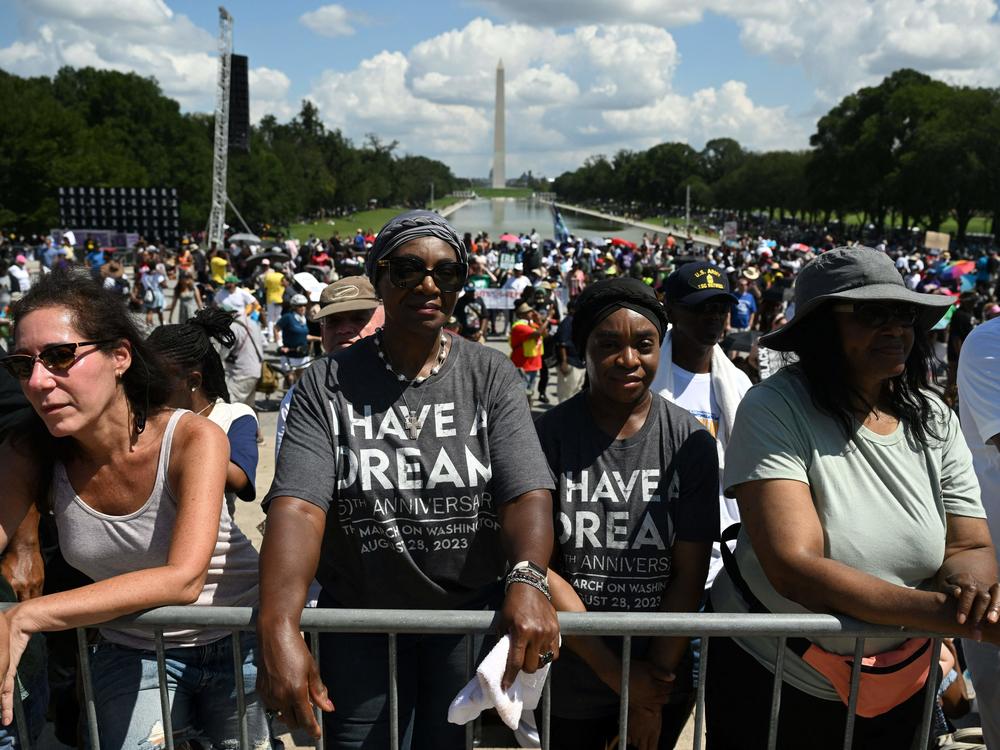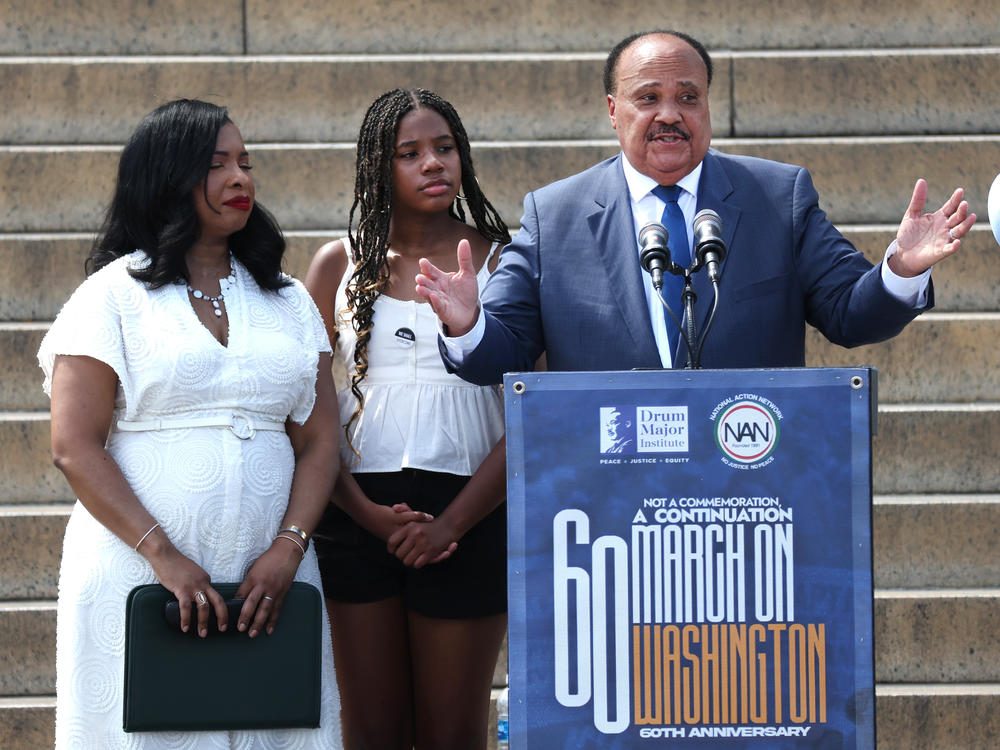Section Branding
Header Content
Thousands march to mark the 60th anniversary of MLK's 'I Have a Dream' speech
Primary Content
Six decades ago, an estimated 250,000 people gathered at the Lincoln Memorial for the March on Washington for Jobs and Freedom in the nation's capital. Martin Luther King Jr.'s "I have a dream" speech that day, on August 28, 1963, has since emerged as a paramount symbol of the push for racial and social equality.
On Saturday, tens of thousands of people gathered in that same spot to declare that dream was in jeopardy — that America had slid backwards in its fight against hatred and bigotry.
"Sixty years ago, Martin Luther King talked about a dream. Sixty years later, we're the dreamers," said civil rights activist Rev. Al Sharpton, who leads the National Action Network, one of two groups that organized the rally.
The nonprofit Drum Major Institute co-hosted the event, which was billed as "not a commemoration" but a "continuation" of King's vision after a year of Supreme Court rulings and national legislation that rolled back racial progress.
Speakers called for an end to hate and bigotry
The five-hour program featured dozens of high-profile speakers who noted the prevalence of civil rights abuses, such as systemic racism, hate speech, hate crimes, police brutality, gun violence, poverty, the loss of voting rights and the collapse of reproductive rights, to name just a few topics that surfaced.
"We are here to liberate the soul of the nation, the soul of democracy from those forces who would have us all go backwards and perish rather than go forward as sisters and brothers," said Arndrea Waters King, the daughter-in-law of Martin Luther King Jr., one of a number of his family members who spoke at the event.
People carried "Black Lives Matter" banners and wore "I have a dream" T-shirts as they listened to the speeches and marched to King's memorial statue. Many took refuge in the shade of trees along the Lincoln Memorial as temperatures soared into the upper 80s.
Despite the crowds, rugby games went along as planned across the Mall, while joggers and bikers stuck to their routes, according to a report from The Associated Press. The sound of planes taking off from nearby Ronald Regan National Airport thundered over some of the speakers.
And while the crowd size may have been smaller than the quarter million people who turned out in 1963, Saturday's event boasted some undeniable signs of progress. Many of the speakers who took the podium were women — only one female speaker was featured at the original march.
And just as this year's lineup of speakers was more diverse, so too were the issues they spotlighted.
Actor Sasha Baron Cohen called for an end to antisemitism. Parkland school shooting survivor David Hogg called for younger generations to run for office in response to gun violence.
Democratic members of Congress, including South Carolina Rep. James Clyburn and New York Rep. Hakeem Jeffries, called for federal voting rights protections as some states continue to restrict election rules.
Activists say the progress made by King's generation is in jeopardy
King's 1963 speech is credited with helping pave the way for major federal voting rights legislation, as well as the landmark 1964 Civil Rights Act. But pushback and violence followed, too.
Just two weeks after the gathering, four Black children were killed in the 16th Street Baptist Church bombing in Birmingham, Ala. A year later, voting rights marchers were brutally beaten while crossing the Edmund Pettus Bridge in nearby Selma.
Commemorations of the original 1963 gathering have taken place over the decades, and King's speech continues to resonate — both serving as major symbols of America's push and pull toward justice.
Tens of thousands of people marched in D.C. following the police killing of George Floyd in 2020, as millions across the country took part in racial justice protests and rallies.
For some, Saturday's event was yet another a poignant measure of how much work has yet to be done.
"I often look back and look over to the reflection pool and the Washington Monument and I see a quarter of a million people 60 years ago and just a trickling now," Marsha Dean Phelts of Amelia Island, Florida told the AP.
"It was more fired up then. But the things we were asking for and needing, we still need them today," she added.
Several leaders who helped organize the march met with Attorney General Merrick Garland and Assistant Attorney General Kristen Clarke on Friday. They discussed a range of issues, including policing, redlining and voting rights.
President Joe Biden and Vice President Kamala Harris will observe the march's true anniversary on Monday by meeting with organizers of the 1963 gathering, the AP reported.
Copyright 2023 NPR. To see more, visit https://www.npr.org.


